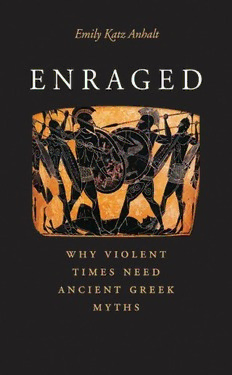
Enraged: Why Violent Times Need Ancient Greek Myths PDF
Preview Enraged: Why Violent Times Need Ancient Greek Myths
Enraged This page intentionally left blank Enraged Why Violent Times Need Ancient Greek Myths EMILY KATZ ANHALT New Haven and London Published with assistance from the foundation established in memory of Philip Hamilton McMillan of the Class of 1894, Yale College. Copyright © 2017 by Yale University. All rights reserved. This book may not be reproduced, in whole or in part, including illustrations, in any form (beyond that copying permitted by Sections107 and 108 of the U.S. Copyright Law and except by reviewers for the public press), without written permission from the publishers. Yale University Press books may be purchased in quantity for educational, business, or promotional use. For information, please e- mail [email protected] (U.S. offi ce) or [email protected] (U.K. offi ce). Set in Minion type by IDS Infotech, Ltd. Printed in the United States of America. Library of Congress Control Number: 2017930760 ISBN978-0-300-21737-7 (hardcover : alk. paper) A catalogue record for this book is available from the British Library. This paper meets the requirements of ANSI/NISO Z39.48–1992 (Permanence of Paper). 10987654321 For Eduardo ἔστιγὰρ ἡμῖν σήμαθ᾽, ἃ δὴ καὶ νῶϊ κεκρυμμένα ἴδμεν ἀπ᾽ ἄλλων. This page intentionally left blank Contents Acknowledgments ix A Note on the Texts, Translations, and Notes xiii Introduction: The Power of Stories 1 one. Passions and Priorities (Iliad1) 13 two. Them and Us (Iliad6) 29 three. Cultivating Rational Thought (Iliad9) 51 four. Violence, Vengeance, and a Glimpse of Victory (Iliad10–24) 80 five. The Dangers of Democratic Decision Making (Sophocles’ Ajax) 115 six. The Abuse of Power and Its Consequences (Euripides’ Hecuba) 149 Conclusion: The Ends of Self- Government 184 Notes 197 Bibliography 233 Index 255 This page intentionally left blank Acknowledgments For their insight, inspiration, and constructive critiques, I am most especially indebted to Richard Garner, Donald Kagan, Kurt Raafl aub, and William C. Scott. This project has been percolating for a very long time. As an undergraduate at Dartmouth College, I fi rst visited ancient Greece under the guidance and encouragement of Edward Bradley, Norman Doenges, Victor Menza, Christine Perkell, William C. Scott, Stephen Scully, James Tatum, and Christian Wolff. They introduced me not only to ancient Greek but also and especially to modes of study and inquiry that have enriched my life and brought me great joy and great solace. Their wisdom, enthusiasm, and pedagogical expertise remain the gold standard. I am similarly indebted to professors and colleagues at Yale University, whose kindness, generosity, and exemplary scholar- ship continue to inspire me: Robert Albis, Judith M. Barringer, Deborah Beck, Victor Bers, A. Thomas Cole, Richard Garner, George Goold, Judith M. Guston, John Herington, Donald Kagan, J. E. Lendon, Elizabeth Meyer, Sheila Murnaghan, Jerome T. Pollitt, Shilpa Raval, Joe Solodow, Gregory Thalmann, Elizabeth Tylawsky, Heinrich von Staden, Alysa J. Ward, and Gordon Williams. I also owe a great debt to Gregory Nagy for
